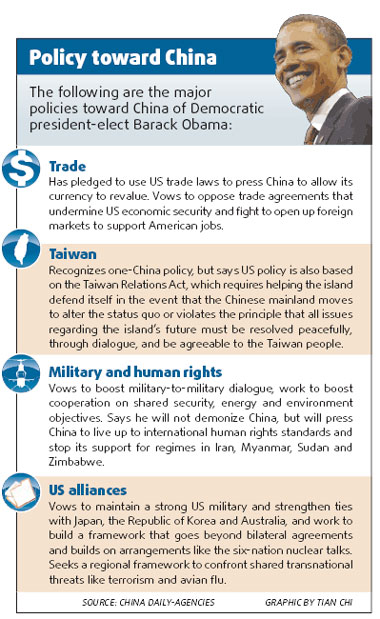Sound Bites
Obama's trade policies tend to stand up for American blue-collar workers and US-based production, which may lead to a rise in trade protectionism. His pledge to help workers who lose their jobs due to foreign competition and globalization will decrease the country's overseas investments, and hinder markets in developing countries in Asia and other places. Though Obama has always stated his support for free trade, his philosophy and the background of his interest group, shows a tendency toward trade protectionism. This requires our close attention.
Yuan Peng
Director of the Institute of American Studies with the China Institute of Contemporary International Relations
Obama has basically continued the Democrat's guiding principle on the Taiwan question and supports the "status quo". He insists on the "One-China" policy and will not accept a unilateral change in the status quo in the Taiwan Straits. He also adheres to the Taiwan Relations Act and will continue supporting a peaceful resolution of the issue.
We are happy to see Obama's position and look forward to seeing the joint efforts by the Chinese government and Obama's administration in keeping peace and stability across the Straits.
Tao Wenzhao
Senior fellow at the Institute of American Studies with the Chinese Academy of Social Sciences
Obama's background and racial experiences will help him to better deal with the political and cultural diversity in the world and understand developing countries. The American people might pin their hopes on Chinese assistance in dealing with the financial crisis but China's interests and capacity will not be able to offer great help. I hope the new US administration will realize that the real difficulty is the US itself. Revival of the US economy is in the interests of not only the Americans but of all people in the world.
Shi Yinhong
Director of the Center for American Studies with Renmin University of China
Certainly there has been a lot of continuity in terms of US policy towards China, regardless of which party is in power. Each party tends to follow the same overall approach to China, which is as much as possible to engage with China, to work together, and to expand relations between our two countries. China has purchased a lot of treasury bills, so the financial connections between the two countries are very strong.
Kenneth Jarrett
Former US consulate-general in Shanghai
I think Obama is more inclined to view China as a cooperative partner like the Clinton administration did. In the long run, I think Obama is less likely a rival and more a potential partner strategically for China. People in Obama's foreign policy team are not hardliners by any means, and they are not people who want to confront China.
Richard Baum
Director of the UCLA Centre for Chinese Studies and a Democrat
The US and China need to sit down and work out a collaborative response to the current financial turmoil. It is no time to start apportioning blame. It does not matter which area one looks at, cooperation between the US and China is vital for development and harmony. I think that a new presidency will be looking to engage in new forms of dialogue with China. The US administration will have to find a new approach to dealing with China and should engage in new forms of dialogue with China.
Anthony Saich
Harvard University and a British national

(China Daily 11/06/2008 page9)














